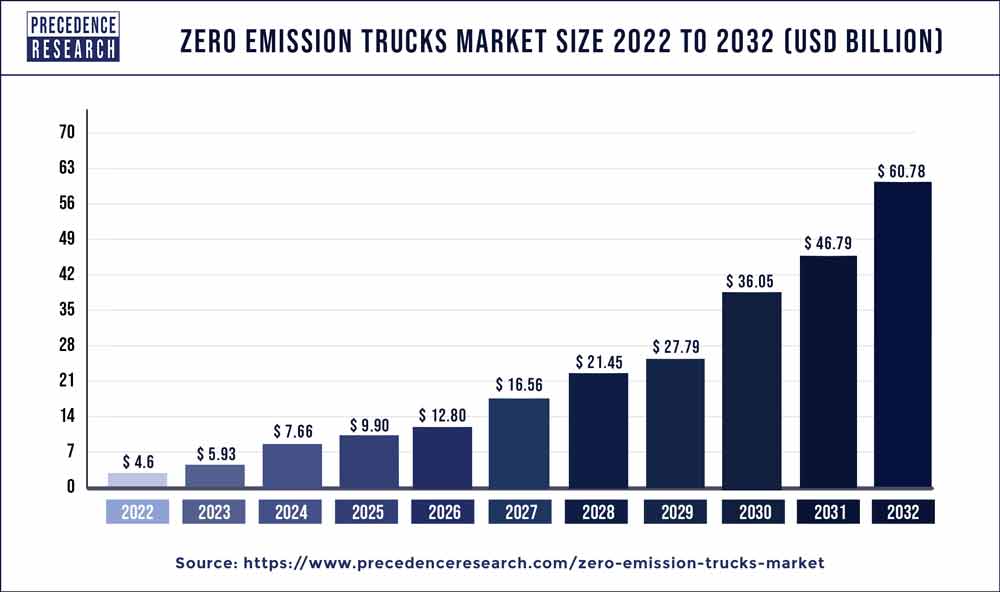Zero Emission Trucks Market Size To Cross USD 60.78 Bn By 2032
Key Takeaways
- North America is projected to hold a significant share in the market during the forecast period.
- Asia Pacific is expected to witness a significant expansion during the projected timeframe.
- By vehicle type, the electric light-duty trucks segment dominated the zero emission trucks market in 2022.
- By vehicle type, the electric medium-duty trucks segment is observed to expand at the fastest rate during the forecast period.
- By source, the battery electric trucks segment dominated the market in 2022.
- By source, the hybrid electric trucks segment is observed to witness the fastest expansion over the forecast period.
- By application, the logistics and transportation segment dominated the market in 202

Vehicle Type
Commercial Vehicles:
The Zero Emission Trucks Market encompasses various vehicle types, with a significant focus on commercial vehicles. This category includes electric and hydrogen fuel cell trucks designed for transporting goods over short and long distances. The commercial segment is crucial for addressing the environmental impact of freight transportation, a sector traditionally associated with high emissions.
Public Transport Vehicles:
Public transportation is another key area within the Zero Emission Trucks Market. This includes electric and hydrogen-powered buses that cater to urban and suburban transit needs. Governments and municipalities are increasingly adopting zero-emission public transport options to reduce air pollution and promote sustainable mobility solutions.
Source
Electric Trucks:
Electric trucks are a major source of innovation within the Zero Emission Trucks Market. These vehicles rely on electric power stored in batteries, offering a clean and efficient alternative to traditional diesel trucks. The development of advanced battery technologies and charging infrastructure is pivotal for the widespread adoption of electric trucks in various applications.
Hydrogen Fuel Cell Trucks:
Hydrogen fuel cell trucks represent another significant source in the market. These vehicles use hydrogen gas to generate electricity through fuel cells, emitting only water vapor as a byproduct. The hydrogen fuel cell technology addresses challenges related to longer ranges and quicker refueling times, making it suitable for applications like long-haul transportation.
Application
Urban Distribution and Delivery
One prominent application of zero-emission trucks is in urban distribution and delivery services. Electric trucks are well-suited for short-distance deliveries within cities, contributing to reduced emissions and improved air quality in urban areas. This application aligns with the growing emphasis on sustainability in the logistics and e-commerce sectors.
Long-Haul Transportation
Zero-emission trucks, particularly those powered by hydrogen fuel cells, are increasingly being explored for long-haul transportation. The need for extended ranges and faster refueling times makes hydrogen fuel cell technology a viable option for trucking companies engaged in cross-country or inter-city transportation, offering a sustainable alternative to traditional diesel-powered trucks.
Public Transit
The use of zero-emission trucks extends to public transit applications, specifically in the form of electric buses. These buses contribute to cleaner air in urban environments, addressing the environmental concerns associated with traditional diesel buses. Governments and transit agencies are investing in electrified public transport fleets to reduce greenhouse gas emissions and improve air quality for urban dwellers.
Recent Developments
- In December 2023, the Middle East’s first all-electric, zero-emission ready-mix truck was unveiled by CEMEX. The truck can carry a full load of concrete and is fully functional, according to the manufacturer. It has a 350kWh battery that is state-of-the-art and can run the device for an average workday on a single charge. In order to find, test, learn from, and scale the long-term solutions required for hybrid and zero-emission vehicles to be widely available, CEMEX is working with manufacturers and partners.
- In September 2023, Alfa Laval and Scan Global Logistics announced the launch of their first electric scania truck as part of zero emissions partnership. The zero-emission truck is manufactured in close collaboration with Scania, which will operate a designated lane between Alfa Laval’s manufacturing sites in Sweden along with SGL in Denmark.
Zero Emission Trucks Market Companies
- Daimler
- Volvo
- PACCAR
- Faw Jiefang Group
- Man
- Scania
- Shaanxi Heavy Duty Automobile
- Isuzu Motors
Segments Covered in the Report
By Vehicle Type
- Electric Light-Duty Trucks
- Electric Medium-Duty Trucks
- Electric Heavy-Duty Trucks
By Source
- Battery Electric Trucks (BEVs)
- Hydrogen Fuel Cell Electric Trucks
- Hybrid Electric Trucks
By Application
- Last Mile Delivery
- Logistics and Transportation
- Construction
- Waste Management
By Geography
- North America
- Europe
- Asia-Pacific
- Latin America
- Middle East and Africa
Contact Us:
Mr. Alex
Sales Manager
Call: +1 9197 992 333
Email: sales@precedenceresearch.com
Web: https://www.precedenceresearch.com
Blog: https://www.expresswebwire.com/
Blog: https://www.uswebwire.com/
